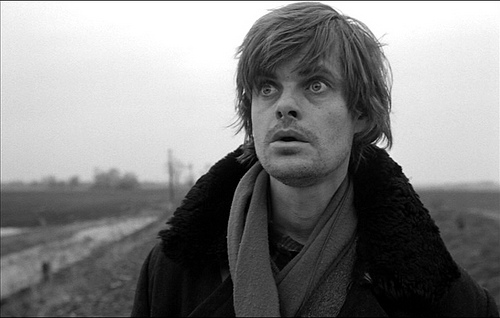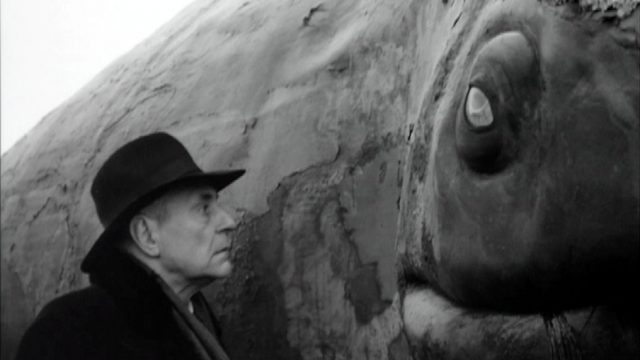Nightmares have a strange kind of beauty. Perhaps that’s why we’re fascinated by horror films. One of the films that was discussed in this series last year, Heart of Glass (1976), gave us a hypnotic version of the pre-history of Nazi Germany. Conversely, Hollywood views horror as a key part of its burgeoning entertainment empire—whatever is intended to scare us is packaged as a consumerist spectacle. No matter the stylistic edginess, it serves as the cinematic equivalent of comfort food.
I guess that’s why I seem to be more interested, this year, in looking at films made outside of the U.S. We’ll start with Werckmeister Harmonies (2000) directed by Bela Tarr. While animated by a gothic undercurrent, it remains enigmatic, making the convoluted narrative of Heart of Glass look nearly crystalline clear by comparison.
In Werckmeister Harmonies, horror is not simply a means to an end. Rather, it’s used to break down our defenses, bringing other, more elusive and less predictable, responses to the surface. Tarr insists that such a process can never be accomplished quickly and requires an almost impossible degree of focus. To that end, by using very long takes that push minimalism to its limits (39 shots in a running time of 145 minutes), he slows down our sense of watching the film.
 The first scene is set in a bar at closing time. János Valuska, a young man who looks like a perpetually-dazed monk, directs the drunken and disheveled patrons in a dance that enacts the wonder of a solar eclipse, a testament to the belief that everything can stop and yet start again. Then everyone leaves to face a much grimmer reality, their rural Hungarian town being on the verge of social collapse.
The first scene is set in a bar at closing time. János Valuska, a young man who looks like a perpetually-dazed monk, directs the drunken and disheveled patrons in a dance that enacts the wonder of a solar eclipse, a testament to the belief that everything can stop and yet start again. Then everyone leaves to face a much grimmer reality, their rural Hungarian town being on the verge of social collapse.
The next day a ramshackle circus arrives, to be met with dismay when it’s discovered that the only attraction is a large stuffed whale, accompanied by a shadowy figure called the Prince. The only one infatuated by the whale is János, who sees it as representing the spiritual beauty of nature.
But when we see the whale it looks rather ugly, a denizen of the deep whose ignoble resting place underlines the misery of the daily lives of the townspeople. As tensions mount, the film’s pessimistic worldview comes to the fore: any means for regeneration will not be cosmic, natural, or spiritual, but must be borne out of violence.
Although a more apt title for the film might be “The Philosophy of a Dead Whale,” the actual title refers to a 17th-century composer who developed what we now call the traditional way of tuning musical instruments. The second, older, misfit character in the film, György Eszter, is devoted to a pursuit, as quixotic if not more so than that of János, to explore playing music on a piano tuned to an archaic form of “just intonation,” what he thinks is a purer form than what Werckmeister developed.
Once a prominent politician, György has turned his back on the town in his devotion to his musical studies, creating a power vacuum. What has resulted is a struggle between Tünde, his estranged wife, who is rallying the remnants of the old authoritarian order, and the crowd milling around the exhibit grounds, whose barely suppressed anger is all the Prince needs to create a mob revolt.
Things turn weird rather quickly. János goes to put the children of the police chief, Tünde’s lover, to bed and finds them wearing their father’s boots, waving swords, jumping on the bed, banging things, and screaming over and over again, “It will be hard for you!” This release of the infantile monsters of the id seems to go on forever—but such a nightmare is merely a prelude to a darkness that blots out the light of reason like an eclipse.
As if by telepathy, the Prince whips the crowd into a frenzy. They march in file to a hospital where they ransack it and beat up the patients, the savagery of a newly empowered group acting on the powerless that has numerous chilling historical parallels.
Yet there’s no precedent for what happens next: the mob encounters a naked old man who looks like a translucent skeleton. Faced with such an image of complete abjection, the mob turns back. Perhaps the old man reminds them of what the Prince would have them forget—all of their rage, fear, and violence cannot transcend their own bare lives.
János becomes further dissociated. What we have just seen, his passively observing the nighttime chaos, is put into question when afterwards we see him reciting an entry in his diary that implicates him as a conspirator in the riot.
 He goes on the run to escape the military reprisal against the rioters. In a stunning scene, he is tracked by a helicopter that descends out of the sky. He has become one of the powerless subjected to the vengeance of the powerful, and loses his mind.
He goes on the run to escape the military reprisal against the rioters. In a stunning scene, he is tracked by a helicopter that descends out of the sky. He has become one of the powerless subjected to the vengeance of the powerful, and loses his mind.
The last scene is György’s encountering the whale that is now lying on the ground amidst the ruins of the circus. He examines the whale and then walks on. He has seen, and believes he knows, the imperfection of the universe, which makes, for him, political involvement meaningless.
But despite György’s deep investment in his studies, he has a superficial understanding of what can make people act: a collective realization that there’s something that haunts us all. It’s the experience, which we tend to fear, of madness or death, an experience that we can never, really, know. Or the experience that we cannot know might be something else—and that something else is on what the film memorably compels us to reflect.

